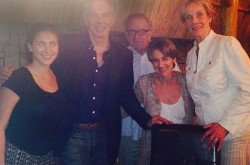An Emotional Experience at the Rwandan Genocide Commemoration Event
Our Co-Founders, Harry Leibowitz and Kay Isaacson-Leibowitz, traveled to Rwanda to visit 2009 Youth Honoree Jessica Markowitz and to attend the 20th Anniversary Commemoration of the Rwandan Genocide. To learn more about their travels, visit our Rwanda page. The following is a reflection about the event from Harry.
Today, [April 7, 2014], at the invitation of the government of Rwanda, we attended the 20th anniversary commemoration of the Rwandan genocide.
It was an incredibly moving and emotional experience. As one survivor started to recount his story of survival, shrieks rang out throughout the stadium which was packed with about 30,000 people. These people were wailing for their lost loved ones and for the pains inflicted on them. They had to be carried from the stadium by medical personnel because they were catatonic. I had goose bumps the entire time.

While the theme of the program was reconciliation, and, in fact, Rwanda has done a remarkable job in putting the horrors of the genocide behind it, there was still tension felt mostly when the wailing began.
A couple of nights earlier, in Kigali, Rwanda, we were invited to dinner at the home of Mr. and Mrs. Dusenge Emmanuel who is Minister of Youth in the Rwandan Government. Also in attendance were Jessica Markowitz, 2009 Youth Honoree at World of Children, and her mom, Lori, plus several other people.
Among the other guests were Ms. Margot Messier, a 92-year-old survivor of the Nazi genocide, and Professor Deborah Lipstadt, noted author and historian who is Professor of Modern Jewish and Holocaust Studies at Emory University.
Since all of us were here for the 20th anniversary commemoration of the Rwandan Genocide, the discussion centered on genocide on a historical and global level. There is no doubt that history shows us that genocide is one of the most ancient tools people have used in an always futile attempt to eliminate those they felt were inferior and as a tool to magnify their own importance at the price of others. Just follow the history of Jerusalem and you get a picture of this: whether it was the Babylonians in 597 BCE, or the Persians after them, or Alexander the Great, followed by the Hasmoneans, and so on, all attempted to completely wipe out the ones who preceded them to secure their control. Of course, it did not work.
So the question remains, “What makes us think that we can stop genocide?”
At our dinner the answer we concluded was “probably nothing…but to do nothing is unacceptable.” The only hope we have as humans is that education and interconnecting peoples and races can have a positive effect on delaying or diminishing the next potential genocide.
It’s that sort of hope that was ringing from the stands of Amahoro Stadium today when Paul Kagame, President of Rwanda, shared his remarks: “If the [Rwandan] Genocide reveals humanity’s shocking capacity for cruelty, then Rwanda’s choices…to stay together and to be accountable to each other…show its capacity for renewal.”
Let’s hope he is right.